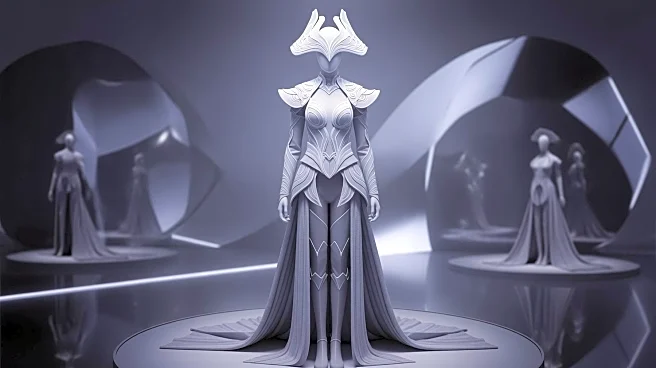What's Happening?
Hunter Schafer, known for her role in Euphoria, made a striking appearance at Vogue World: Hollywood, wearing an original costume from the 1992 film Orlando. The film, directed by Sally Potter, is a loose adaptation of Virginia Woolf's novel, featuring
Tilda Swinton in a role that transitions from a nobleman to a lady across centuries. The costume, designed by Oscar and BAFTA award-winning Sandy Powell, is noted for its stylized period look, blending elements from the Elizabethan era to the 1990s. Schafer's appearance was part of a broader celebration of fashion and film, highlighting the intersection of historical and contemporary styles.
Why It's Important?
Hunter Schafer's choice to wear the Orlando costume underscores the enduring influence of film on fashion, particularly in high-profile events like Vogue World. This intersection of cinema and couture not only celebrates iconic film moments but also showcases the creativity and craftsmanship involved in costume design. The event highlights the role of fashion as a storytelling medium, capable of bridging different eras and styles. Schafer's participation brings attention to the cultural significance of fashion in Hollywood, reinforcing its status as a powerful form of artistic expression.
What's Next?
The Vogue World event continues to set a precedent for future collaborations between the fashion and film industries. As more celebrities embrace iconic film costumes, there may be increased interest in reviving and reinterpreting classic designs for modern audiences. This trend could lead to more events that celebrate the fusion of fashion and cinema, potentially influencing designers to draw inspiration from historical film wardrobes. Stakeholders in both industries may explore new opportunities for creative partnerships, enhancing the visibility and appreciation of costume design.
Beyond the Headlines
The choice to feature a costume from Orlando at Vogue World highlights the evolving conversation around gender and identity in fashion. The film's narrative, which involves a character transitioning genders, resonates with contemporary discussions on gender fluidity and expression. Schafer's appearance in the costume may inspire further dialogue on how fashion can reflect and challenge societal norms, encouraging more inclusive and diverse representations in both industries.

















